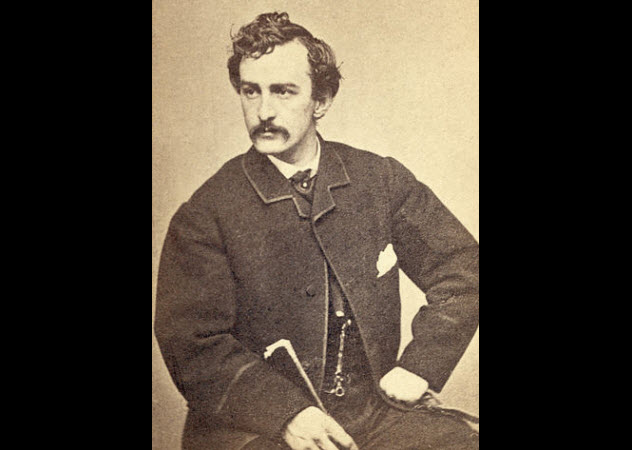 History
History  History
History  Health
Health 10 Everyday Activities That Secretly Alter Consciousness
 History
History Top 10 Historical Disasters Caused by Someone Calling in Sick
 Animals
Animals 10 New Shark Secrets That Recently Dropped
 Movies and TV
Movies and TV 10 Forgotten Realities of Early Live Television Broadcasts
 Technology
Technology 10 Stopgap Technologies That Became Industry Standards
 Weird Stuff
Weird Stuff 10 Wild Facts About Taxidermy That You Probably Didn’t Know
 Travel
Travel 10 Beautiful Travel Destinations (That Will Kill You)
 Miscellaneous
Miscellaneous 10 Modern Marriage Rituals Born from Corporate Branding
 Weird Stuff
Weird Stuff Ten Bizarre Visions of 2026 from Fiction
 History
History 10 “Modern” Problems with Surprising Historical Analogs
 Health
Health 10 Everyday Activities That Secretly Alter Consciousness
 History
History Top 10 Historical Disasters Caused by Someone Calling in Sick
Who's Behind Listverse?

Jamie Frater
Head Editor
Jamie founded Listverse due to an insatiable desire to share fascinating, obscure, and bizarre facts. He has been a guest speaker on numerous national radio and television stations and is a five time published author.
More About Us Animals
Animals 10 New Shark Secrets That Recently Dropped
 Movies and TV
Movies and TV 10 Forgotten Realities of Early Live Television Broadcasts
 Technology
Technology 10 Stopgap Technologies That Became Industry Standards
 Weird Stuff
Weird Stuff 10 Wild Facts About Taxidermy That You Probably Didn’t Know
 Travel
Travel 10 Beautiful Travel Destinations (That Will Kill You)
 Miscellaneous
Miscellaneous 10 Modern Marriage Rituals Born from Corporate Branding
 Weird Stuff
Weird Stuff Ten Bizarre Visions of 2026 from Fiction
10 Historical Figures Who Might Have Had Syphilis
Syphilis has almost been eradicated by medicine in modern times. However, before there was an effective cure for the disease, syphilis was the scourge of the world. It recognized no boundaries, infecting both rich and poor. Syphilis may have caused some of the most important figures in history to either create some of the world’s greatest works or make decisions that altered the course of history.
10 Adolf Hitler May Have Ruled Germany While Suffering From Syphilis

One theory may plausibly explain Hitler’s behavior and decisions while ruling Nazi Germany. Some historians believe that Hitler was suffering from an advanced form of syphilis toward the end of his regime.
Dr. Theodor Morell, Adolf Hitler’s personal physician, kept extensive records about his most famous patient. Most of these records still survive, providing modern historians with a portrait of Hitler’s private life. Many medical researchers who have read the documents have stated that many of his symptoms match those of tertiary syphilis.
Dr. Morell also speculated that Hitler may have had the illness. In Mein Kampf, Hitler devoted several pages to syphilis, even calling it “the Jewish disease.” Dr. Morell noted symptoms such as severe gastric crises, skin lesions, and violent mood swings as evidence that Hitler had contracted syphilis and “sudden criminal behavior, paranoia, grandiosity and mania, all of which changes show in cases of neuro-syphilis.”
Toward the end of his life, Hitler became increasingly erratic and detached from reality. Dr. Morell prescribed iodide salts for Hitler, although they’re also used for angina and chest pain, another of Hitler’s complaints.
The syphilis theory is somewhat discounted because most of the evidence is circumstantial. Still, it can’t be entirely discredited, even if it was just a contributing factor to Hitler’s behavior. If he did have syphilis, another question arises: How did he catch it? Ironically, some say he caught it from a Jewish prostitute.
9 Christopher Columbus Introduced Syphilis To Europe

Although Christopher Columbus is generally credited with discovering America, at least one of his other discoveries was less than noble. In fact, it would prove to be one of the most aggressive diseases of all time.
Before Christopher Columbus arrived in the New World, syphilis was a disease indigenous only to the western hemisphere. As we all know, syphilis is a sexually transmitted disease, but Columbus and his crew were unaware of it. As they began to have sexual relations with the natives, some of the crew caught the dreaded sickness.
When Columbus returned to Europe, he presented many interesting gifts and other curiosities. But people didn’t expect him to bring back a new disease. Syphilis began to spread rapidly after Columbus returned. Soon, it became a full-blown epidemic affecting many European countries.
Although there were many different treatments, the Europeans of those times had no real cure. Despite physicians’ best efforts, nothing could stop the deadly spread of syphilis throughout the continent. As a result of Columbus’s voyage, he had unwittingly released in Europe one of the worst diseases in history.
8 Beethoven Wrote His Compositions While Suffering From Syphilis

Throughout his life, Beethoven composed some of the greatest symphonies of all time, but he also had to deal with several handicaps. It’s well-known that Beethoven was almost completely deaf in his later years, but he may also have had syphilis.
Beethoven suffered from chronic illnesses, but many of them remain undiagnosed. He also had a tragic personal life because of his romantic view of love. His personal relationships were often unfulfilling because his idea of romance didn’t fit reality. As such, he often had sexual relations with prostitutes and may have caught syphilis because of this.
It’s also possible that Beethoven had congenital syphilis (syphilis at birth). There’s evidence to discount the theory that Beethoven had the disease, such as the fact that no mercury was found in his hair when mercury was a common syphilis treatment. However, many of his physical and psychological symptoms match those of syphilis.
Some believe that Beethoven’s deafness may have been caused by syphilis. Other symptoms include chronic pain, which was a common complaint for Beethoven. Many of his psychological and physical symptoms, such as frequent migraines, could also be attributed to syphilis.
Could Beethoven have written his greatest works while suffering from the worst of diseases? It’s interesting to believe so.
7 Abraham Lincoln May Have Had Syphilis While President

If Abraham Lincoln had syphilis, he was killed before the symptoms became too severe. In America, syphilis was common at the time because there was no protection from the disease and no real cure. Even though Lincoln was shot before the later stages of syphilis were manifested, there is medical evidence that Lincoln had the disease. There is also considerable evidence that he gave the disease to his wife.
Before Lincoln married his wife, Mary Todd, he often consorted with prostitutes, which could have been where he contracted the disease. Around 1835, Lincoln admitted to his close friend and biographer William Herndon that he’d caught the disease. Later, Herndon speculated that syphilis may have caused the Lincoln children to die prematurely.
Lincoln often took “little blue pills” (mercury pills), which were a common treatment for the disease at the time. Possibly the greatest evidence that Lincoln had syphilis was his wife’s manifestation of the symptoms. Syphilis produces a variety of psychological symptoms that cause insanity: Mary Todd Lincoln most certainly had those.
She was known for her erratic behavior in later life, and she complained of hallucinations and delusions. Mary Todd also developed blindness and had extreme weight loss, other possible symptoms of syphilis. She had insomnia, impaired coordination, migraines, and chronic pain. When an autopsy was performed, her brain showed signs of nerve deterioration, which may have been related to syphilis.
6 John Wilkes Booth May Have Been Suffering From Syphilis During The Assassination

It’s undeniable that John Wilkes Booth was mentally unstable. However, it isn’t known what caused his insanity. Theories range from alcoholism to mental disorders, but one theory has enough evidence to possibly be accepted as fact: John Wilkes Booth had late-stage syphilis.
The world in which Booth was born and raised was a fertile one for syphilis. Booth was a handsome man and a popular actor from a famous family. It would have been easy for him to find sexual partners. He was a frequent womanizer, so catching syphilis was probably only a matter of time.
Although young when he killed Lincoln, Booth’s career was almost over. He suffered from hoarseness, a common symptom of syphilis, which made him unable to project his voice on stage. Other possible symptoms include the tumors which he had removed from his back and neck, frequent rashes all over his body, and pain in his chest.
He also showed the psychological signs—mental instability, delusions, mood fluctuations, and depression. He was known to fly into angry rages at the slightest provocations. Booth also became impulsive, a symptom indicative of the deterioration of the frontal lobe, which is common with syphilis.
If Booth did indeed kill Lincoln because of mental illness caused by syphilis, imagine how different history would have been if he had never caught the disease.
5 Charles VIII Caught Syphilis And Started An Epidemic

King Charles VIII of France had an obsessive desire to reclaim the Kingdom of Naples. In 1491, he married Anne of Brittany, ceding the rights to several territories to her family. In 1493, he signed the Treaty of Barcelona, which gave even more French territories away. Only Charles knew why he had made such strange decisions: He wanted to get rid of all concerns so that he could conquer Naples.
Finally, in 1495, he marched into Naples without opposition and received the crown. Unfortunately for Charles, almost every other kingdom in Italy opposed his leadership. They banded together to form the League of Venice and defeated Charles at the Battle of Fornovo. Charles and the remainder of his army fled back to France.
Apparently, sailors from Christopher Columbus’s crew had gone to Naples, where they spread syphilis. When Charles and his army occupied the kingdom, they had sexual relations with people in Naples and subsequently contracted the disease. During their retreat, Charles and his army caused an epidemic of syphilis throughout Europe. As a result, syphilis became known as the “French disease.”
4 Ivan The Terrible’s Infamous Reign May Have Been Caused By Syphilis

While Ivan the Terrible was a relatively sane and just ruler at the beginning of his reign in Russia, he became increasingly insane and cruel in his later years. In one fit of rage, he even killed his son. While insanity is quite common in royalty, there seemed to be no reason for Ivan the Terrible’s sudden change in personality. However, recent medical evidence shows what the cause may have been.
As mentioned earlier, mercury was a common treatment for syphilis before there was an effective cure. So when Ivan the Terrible’s body was tested by forensic scientists centuries after his death, they put two and two together when they found high levels of mercury in Ivan’s corpse. Of course, mercury poisoning could have also actually caused many of Ivan the Terrible’s psychological symptoms, rather than the other way around. But why would Ivan’s physicians have given him mercury in the first place?
There’s certainly no question that Ivan had ample opportunity to contract syphilis. As the ruler of Russia, he may have had sexual dalliances with a woman or women carrying the disease.
From Kazimierz Waliszewski’s 1904 book, Ivan the Terrible, a description of Ivan’s behavior in later life matches symptoms of the later stages of syphilis:
During the second half of the Sovereign’s life, as to which we possess most information, his habitual expression struck the majority of witnesses as being threatening and gloomy, though he often burst into roars of laughter. [ . . . ] Ivan was energetic to the point of violence, and yet timid down to outright cowardice; his pride amounted to positive madness, and his humility occasionally descended to baseness. He was intelligent, and yet capable of saying and doing the most foolish things.
His paranoia, mood swings, and poor health could all have been caused by tertiary syphilis.
3 Shakespeare May Have Quit Writing Due To Syphilis

Even though William Shakespeare is one of the most famous writers in history, his life remains a mystery to this day. The little we do know comes from outside records and speculation, but at least one theory could explain why Shakespeare abruptly quit writing and went into retirement. The idea comes from Shakespeare’s own handwriting.
At 36, Shakespeare’s handwriting, including his signature, became noticeably different, showing evidence of a tremor in his hand. Why would Shakespeare have developed a tremor so early in life?
In his plays, Shakespeare developed an obsession with syphilis, a disease usually ignored by society at that time. As author D.H. Lawrence wrote: “I am convinced that some of Shakespeare’s horror and despair, in his tragedies, arose from the shock of his consciousness of syphilis.”
Being involved in the theater, Shakespeare was believed to have had a vigorous sexual appetite, so that’s one way he might have become infected. Even gossip from the time said that Shakespeare became involved in a sexual scandal in which he and others caught the illness. At that time, the treatment for syphilis was mercury. Some of the side effects of mercury are psychological changes and the tremors that Shakespeare developed.
2 Vincent Van Gogh’s (Possibly) Syphilitic Inspirations

Vincent van Gogh is one of the most famous names in the art world, but he suffered a tragically short life of almost constant poverty and depression. However, the genius behind the beautiful art can’t be denied. Was van Gogh’s art created from the suffering he may have had from syphilis?
In the 1880s, van Gogh left his childhood home and went to the city of Antwerp in Belgium where he engaged in a libertine lifestyle. There, he started to drink absinthe and regularly hired prostitutes. Although he left Antwerp in 1886 to live with his brother in Paris, van Gogh would have a lasting reminder of his time in Belgium: syphilis.
During this time, he started the most productive period of his life, but he also became increasingly plagued with seizures and delusions. In 1888, van Gogh left his brother and in a fit of insanity, famously sliced off his own ear and presented it to a prostitute as a love gift. He was placed in an asylum where he experienced manic episodes, visions, and paranoia.
Throughout all of this, van Gogh’s paintings became darker and more bizarre. In 1889, he checked himself into an asylum in Saint Remy where he seemed to partially recover. He made some of his best paintings there.
In 1890, he checked out of the asylum, although he was still mentally unbalanced. Things seemed to be looking up for van Gogh as critics started to recognize his work. However, van Gogh went to a field and shot himself. He died two days later on July 27, 1890.
Some people still believe that it was the effects of syphilis that caused van Gogh to kill himself. Others believe that other mental illnesses may have caused van Gogh’s madness, although syphilis is believed to have had a major effect on his life.
1 Oscar Wilde Died Insane With Syphilis

For a time, Oscar Wilde was one of the biggest celebrities of 19th-century England with his sharp wit, whimsical behavior, and curious personality. Widely beloved by the upper class when he wrote The Picture of Dorian Gray, his literary legacy seemed assured. However, a shocking scandal and a sensational trial ruined Wilde. As a final blow, he may have contracted syphilis, which could have affected his mind.
Researcher Richard Ellmann believes that Wilde contracted the disease after a youthful escapade with a prostitute in 1878. However, descendants of the Wilde family have disagreed, stating that he didn’t have syphilis. The problem is that there is some evidence that he did have the disease.
As early as 1912, biographers claimed that Wilde had syphilis. Reginald Turner, Wilde’s only friend who remained with him during the last weeks before his death, had this to say about Wilde’s illness: “[The disease] was only shortly before his death diagnosed as a tertiary symptom of an infection he had contracted when he was 20.”
The wording is vague, but it would match the timeline when Wilde was said to have caught syphilis. Over the years, many of his former friends came to believe that he had syphilis, some even claiming that he had inherited the disease from his father.
Although his death certificate doesn’t list a cause of death, it’s generally agreed that Wilde died of cerebral meningitis, which is inflammation of the lining of the brain. Cerebral meningitis can be caused by syphilis because syphilis causes deterioration in the brain. It’s also known that Wilde had regular mercury treatments, a common therapy for those with syphilis.
Gordon Gora is a struggling author who is desperately trying to make it. He is working on several projects, but until he finishes one, he will write for Listverse for his bread and butter. You can write him at [email protected].








